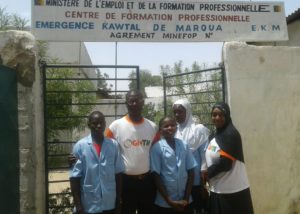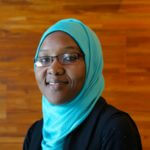Guest post by Nadia Habsatou, 2016 fellow of Cameroon
In 2014, Boko Haram attacked a small village in the Far North of Cameroon. Several public places were destroyed, and today, thousands of children and young people are affected by armed conflict. They face harm, fear, loss, kidnapping and exploitation. Schools are damaged or overtaken by armed groups.
Government and NGOs have created a safe environment for internally displaced people (IDP). The direct consequence, however, is that IDPs feel anxious, depressed and, at times, aggressive. They have lost their confidence and trust in the future.
Being an Emerging Leader opened my eyes to how I can positively impact my community. The GivTH team and I are working to profoundly improve the lives of these children and to show them the beauty of being involved in a technological field through workshops and tailored programs. The collaboration with vocational training centers is a way to enable them to learn new skills and generate their own income. We want them to believe in a bright future and to become changemakers in our country.
In December 2016, our team met the first group of students that our action plan will support. We realized that, with just a few words, we can increase their self-confidence, and we can help them make better career decisions.

M. Mamoudou, pictured second from left, has been working with displaced families in the Far North since 2014. Project Givth has partnered with him to enroll students in vocational training centers.
Let’s help them develop their full potential
With the help of a team of Cameroonians working for the International Committee of the Red Cross in the Far North, we have selected a group of 25 children. M. Mamoudou has been working with displaced families since the beginning of the attacks in 2014. He knows everything about them, and it was easy for us to gain acceptance from parents because of their trust in him.
To date, five of the 25 students, between the ages of 15 and 25 years, are enrolled in vocational training centers. At the end of the year, upon completion of the training program, the students will receive the Professional Qualification Diploma, issued by the Ministry of Employment and Vocational Training. The diploma represents mastery of a coherent set of skills, abilities and knowledge required to practice a profession. Since the diploma is recognized nationally, it will open doors to professional opportunities anywhere in Cameroon. The promoter of the training center is also committed to recruiting students to work in his center at the end of their course.
What next?
The cost of Internet connection remains high and inaccessible for many. We will use RACHEL Offline to download the Cameroon education system, the official exams and make them available to displaced children.
After conducting the first field survey in December 2016, we noticed that they are not aware of technologies that many of us use in our everyday lives. Without an intervention, these children will face a challenging future. We plan to organize workshops to address the digital literacy gap, where they will have the opportunity to learn more about devices (computers, tablets, smartphones, etc.), how to use the Internet (research, email management) and applications (how to use Microsoft Office, how to install/remove applications, etc.).
Volunteers, teachers and computer scientists at the University of Maroua have been supportive. We are grateful for all the assistance provided by those who generously give time and effort to overcome these obstacles and spread hope.
About the author
Nadia Habsatou , 2016 fellow of Cameroon, is the Head of Planning Unit at Cameroon Telecommunications. She holds a master’s in project management and a bachelor’s in information technology. Nadia has professional certifications in PMP and ITILv3. She is a Certified Mentor and was hosted at Symantec during the 2016 program. The program unlocked her “superpowers” and gave her the confidence to have an impact in her community. Nadia, as the team leader of GivTH, is passionate about giving back to her community and helping people.
, 2016 fellow of Cameroon, is the Head of Planning Unit at Cameroon Telecommunications. She holds a master’s in project management and a bachelor’s in information technology. Nadia has professional certifications in PMP and ITILv3. She is a Certified Mentor and was hosted at Symantec during the 2016 program. The program unlocked her “superpowers” and gave her the confidence to have an impact in her community. Nadia, as the team leader of GivTH, is passionate about giving back to her community and helping people.


Speak Your Mind